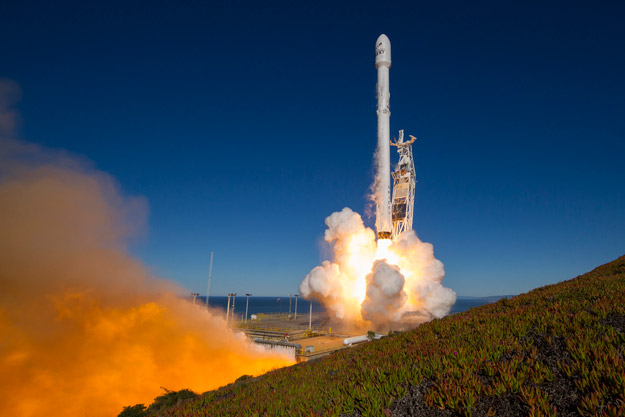Watch SpaceX Nail Two Falcon 9 Rocket Launches And Landings In Weekend Doubleheader

The first launch occurred on Friday, when SpaceX’s second ever recycled Falcon 9 booster was used to put a satellite into orbit for Bulgarian TV service provider Bulsatcom. This particular booster was first used in January to put 10 Iridium satellites into low-Earth orbit (LEO). Considering that the initial launch occurred in January and we are now in June, SpaceX is getting much better at its refurbishment process for the Falcon 9 booster (there was roughly a year between the first and second launches of the previous refurbished booster).
Once the satellite payload was successfully placed into orbit, the Falcon 9 made a successful landing on the “Of Course I Still Love You” drone ship. Due to the fact that the Falcon 9 had to push the BulgariaSat-1 satellite into a higher orbit than usual, the booster was subjected to more heat and stresses during reentry. Those factors led to a rougher than usual landing, reported SpaceX CEO Elon Musk:
Rocket is extra toasty and hit the deck hard (used almost all of the emergency crush core), but otherwise good
— Elon Musk (@elonmusk) June 23, 2017
On Sunday, SpaceX was back again, this time with its second mission for Iridium. The company put a second set of 10 Iridium NEXT satellites into orbit. Iridium NEXT is a $3 billion next-generation global satellite network that “represents the evolution of critical communications infrastructure that governments and organizations worldwide rely upon to drive business, enable connectivity, empower disaster relief efforts and more.”
After pushing the Iridium satellites into orbit, this [new core] Falcon 9 booster made the return voyage home and landed successfully on SpaceX’s “Read the Instructions” drone ship.
So far, SpaceX has safely recovered 13 Falcon 9 boosters, eight of which have been at sea via one of its two drone ships. SpaceX eventually is looking to quicken its launch cadence by sending a Dragon 9 into space once every two weeks.

